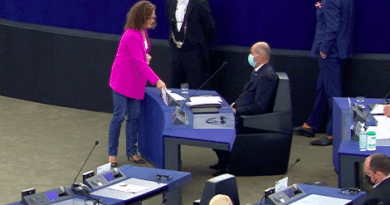Barroso, the marshmallow man with a beautiful social trompe l'oeil
(B2) José-Manuel Barroso finishes, this week, a short tour in front of the political groups to present his program (it started on Monday with the Conservatives and continues on Tuesday with the Christian Democrats (EPP) and the Communists.
Then come the Socialists (S&D), the Greens and the ALDE Liberals (Wednesday). The Conference of Presidents meets on Thursday to decide whether the vote will take place on September 16 or in October. With as an argument, a document of about fifty pages. which summarizes the "political orientations" for not the five years but the ten years to come. " By setting Europe's priorities (until 2020), we can better define the work that awaits the Commission for the next five years ».
The Barroso Marshmallow
Barroso is ambitious… and cautious. He drowns the fish. To me it really looks like marshmallows (marschmallows in English), these marshmallow candies, brightly colored, pink, white, green, to chew, which fill your mouth, melt quickly, becoming a hope of white paw and leaving you in the end only a small impression of sugar, not unpleasant by the way, but which does not really nourish you...
It starts well, ends badly (as always...)
This document however begins in a very interesting way. Might as well say it. I was seduced by the first pages. Yes Yes..
Some strategic questions seem quite clearly posed: “Do we want to lead, shape globalization based on our values? Or are we going to leave the initiative to others. “A strong Europe (…) does not mean an increased centralization of powers in Brussels”. (NB: and indeed European construction – which is now well advanced – must reflect precisely on its relations with the Member States).
And certain sentences are pleasing: “We must put human dignity at the heart of our efforts (…) bridge the gap between the reality of European integration and the perceptions of the population”. " The short-term priority must be to successfully emerge from the crisis, sustain demand and stem the rise in unemployment ". " L'Europe must be more political ". etc
A little more personal spiel follows - “ The Europe I believe in - , elaborated. We feel a convinced Barroso, expressing (no doubt) with his more personal reflections: “JI radically oppose this vision of (the) decline of Europe. I am convinced that Europe's hour has come »(1). « It is only by being united in action that Europe has the necessary critical mass ". "I want to add my stone to the building by helping Europe to fully keep its promises"... We would like to believe in it, to have a driving force there.
The last sentence, however, sounds like a warning: I have always preferred, and will always prefer, concrete achievements to hollow speeches ».
Few concrete proposals
And after that slips, we find the Barroso as we have known him for the past five years: imprecise, elusive, unable to set a course, to align a concrete program, decision-making. Its orientations are a kind of catch-all, intended to catch a little all the fish. And of course to be able to form a majority of parliamentarians who can approve it.
True to form, Barroso makes a number of observations. Moreover, his document devotes more space to defending the achievements of the current Commission than to drawing the lines of future defence. And when there is a proposition, it consists of generalities. Very general. José-Manuel loves to analyze, evaluate...
Analysis, analysis...
He will thus launch an "in-depth analysis of the missing links in the internal market", "draft a complete report on the obstacles encountered by citizens and propose solutions to eliminate them as best as possible", etc. We wonder why this has not not already been done! Ditto for his proposal of " channeling the various existing instruments and strategies (social agenda, Lisbon strategy, etc.), and modifying them if necessary, in order to develop the inclusive and sustainable social market economy ". A little general.
Deja vu…
He also undertakes to identify the skills that will be needed in the future and use Community programs to help Member States provide the necessary skills and competences ". Etc… It's a bit weak. And above all, a sense of deja vu…
A lack of breath
In the end, we have the impression that José-Manuel Barroso has tried, with difficulty, to respond to current challenges: climate change, economic crisis... without asking questions about future challenges (a little foresight would not have hurt) nor answer a few “divisive” questions (few lines, for example, on enlargement and the borders of Europe).
A neoliberal inspiration still very present
Support demand but without budgetary effort
« The priority is to continue to support demand and curb unemployment " With " resolute implementation of the European economic recovery plan, keeping interest rates low and using European state aid rules ". That's all ! But the need for correct excessive deficits with determination and diligence” is firmly remembered. In other words, no possibility of fiscal slippage for the recovery. And nothing on how to reconcile the necessary respect for the stability pact with economic recovery. the "intelligent" side of the pact is not highlighted.
An obsession with administrative burdens
José-Manuel Barroso also proposes a new strategy for industrial policy. We rejoice. And we wait. Nothing… The only proposal is to “ remove unnecessary administrative burdens and provide the legal certainty businesses need to invest for the long term. ". It's his obsession. Further on is its commitment to reduce the administrative burden by 2012 by 25%.
General interest to absent subscribers
You have to develop a modern service sector ". " The overall development of the social and health services sector will need to be stimulated, for example by creating a quality framework for public and social services, which will testify to their importance in the European social model ". All the words are there. But not in the right order. And there is a major absentee. It will be noted that not once is the word “general interest” mentioned for these services which are really at the heart of the general interest. Then he doesn't mention a " cadre European. But a framework (ie it can be national). Finally it is only about the quality ". It doesn't go very far. On the other hand, further on, we find the Commission will propose a new framework for public-private partnerships to facilitate the pooling of different sources of funding to maximize investments in the years to come "...
Disciplined workers
The tastiest is still when he talks about social rights. There is a vibrant call to defend them, not to accept regression, to defend the right to strike. Nothing specific. But when it comes to collaborating with the social partners, the call is more concrete.
« We should move away from the model based on adversarial industrial relations, which is outdated, in favor of a more holistic approach to the workplace, based on the commitment of workers and the quality of work ". In other words: stop whining, going on strike, complaining, work and re-engage. From the pure master of the XNUMXth century forges!
pensions for retirees..
The crisis has “demonstrated the interdependence of the different pillars of pension schemes. (…) It also highlighted that pension funds were an important element of the financial system”. That's all ! If “we must ensure that pensions fulfill their function and provide maximum support to current and future retirees”. It would be a shame if we said otherwise - 🙂
Social concern: a decoy!
Finally. One fact is certain. The social concern that seems omnipresent is a decoy. Admittedly, the objective of "Combating unemployment and strengthening social cohesion" thus appears in second position among its priorities, with the revival of economic growth (first), a sustainable Europe, the security of Europeans, citizenship and participation in the EU. (NB: Gossip would say: one priority per political group, which is not really wrong!) … But despite the words, social Europe remains the poor relation of European politics.
(Nicolas Gros-Verheyde)

